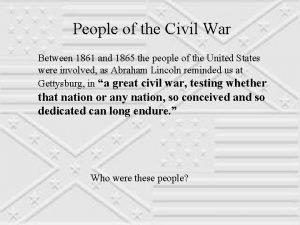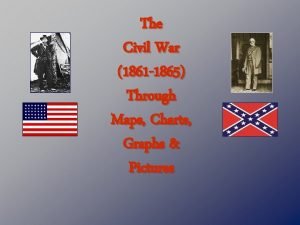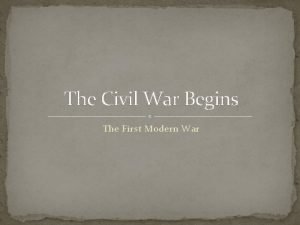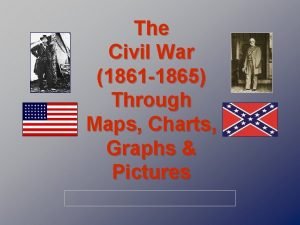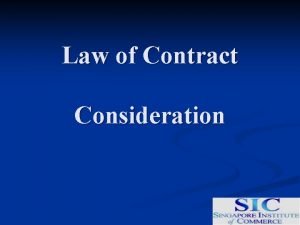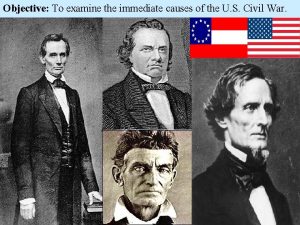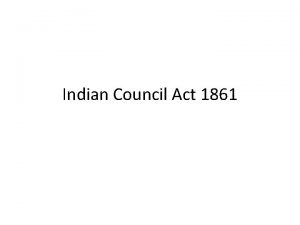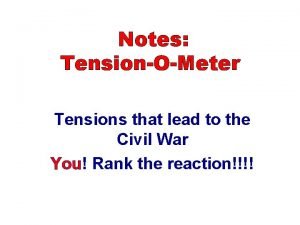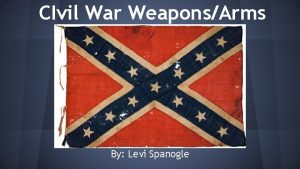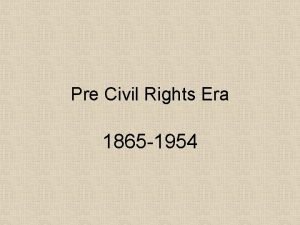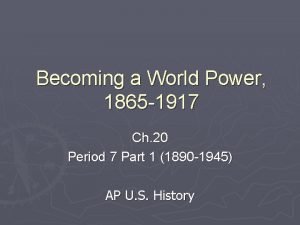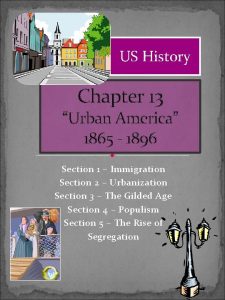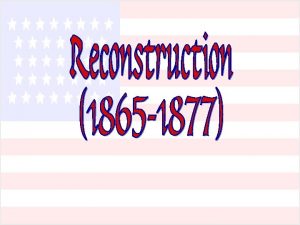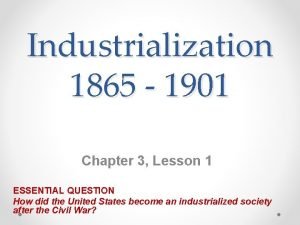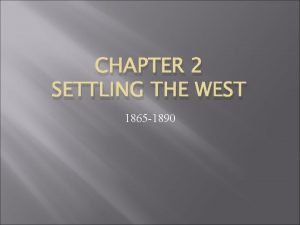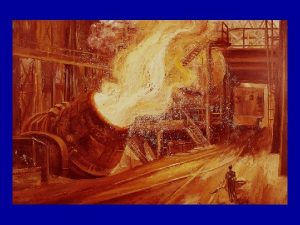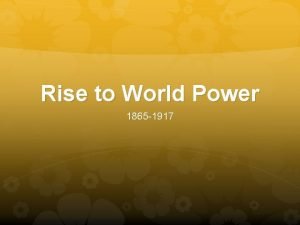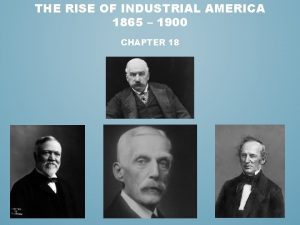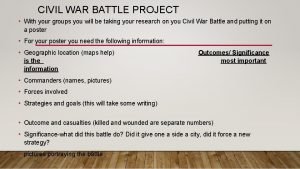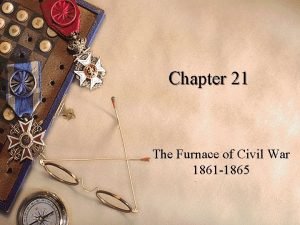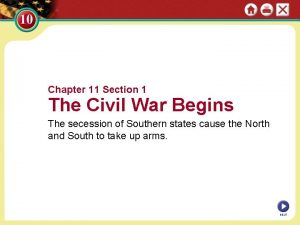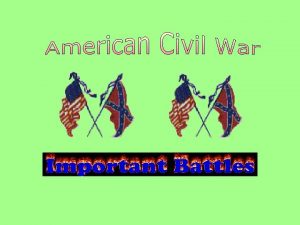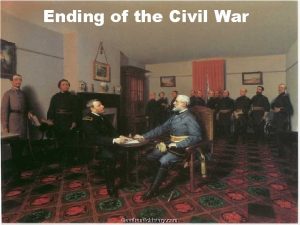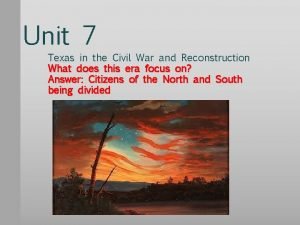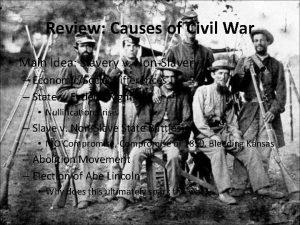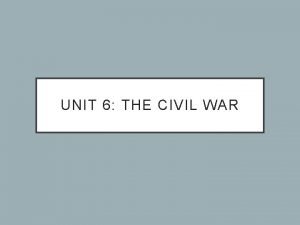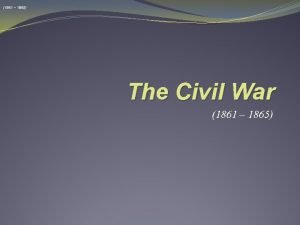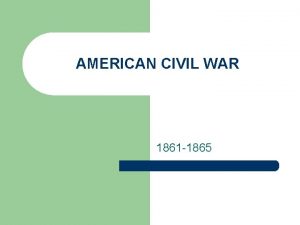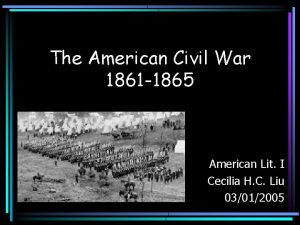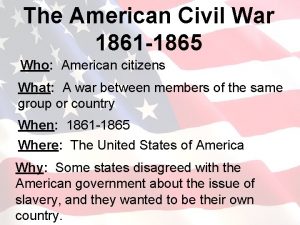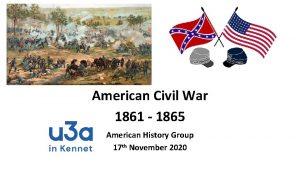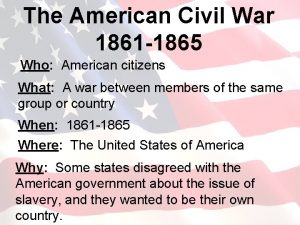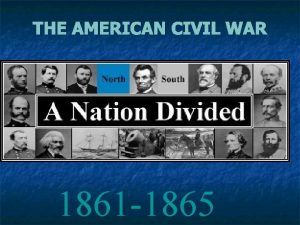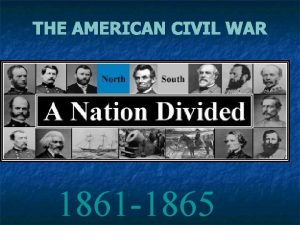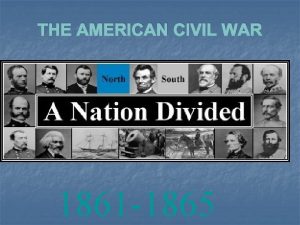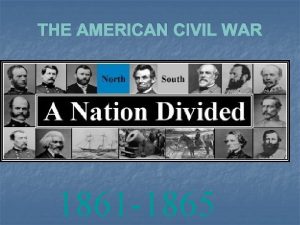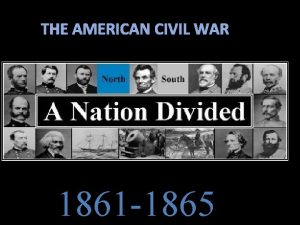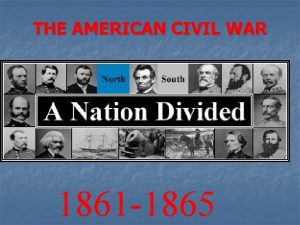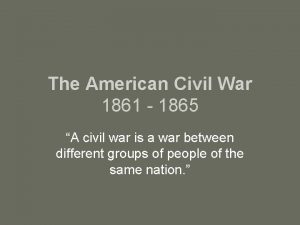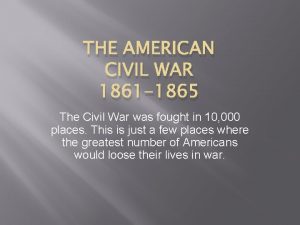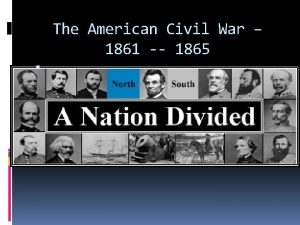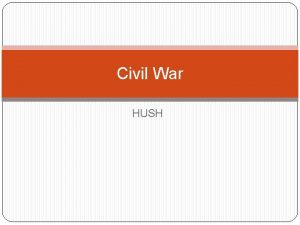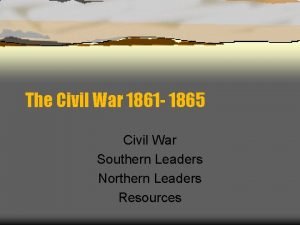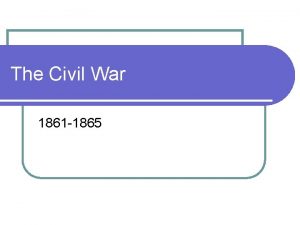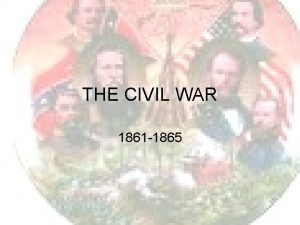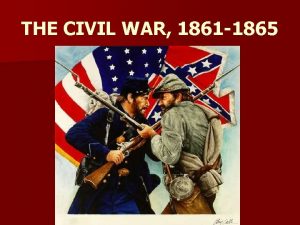THE AMERICAN CIVIL WAR 1861 1865 THE CIVIL





































- Slides: 37

THE AMERICAN CIVIL WAR 1861 -1865

THE CIVIL WAR: UNION VS CONFEDERATE

CONFEDERATE UNION

THE WAR BETWEEN STATES The war lasted from 1861 to 1865 � The war started and ended at Wilmer Mc. Lean’s house � Picture Credit: http: //www. 26 nc. org/Photo. Gallery/Command. Change. Photos/Mc. Lean. House. Music. jpg

MAIN CAUSES � State’s Rights � Slavery � Preserving the Union � Slave vs. Free States Picture Credit: http: //www. disciples. org/convo/Slavery. jpg

Picture Credit: http: //www. historyplace. com/civilwar/cwar-pix/civmap. gif

North South 23 States 11 States Union Confederate Yankee Rebel Blue Coats Grey Coats United States of America Confederate States of America Washington D. C. Richmond, Virginia Free states Slave states

North vs. South Small Larger Towns and Cities and Farms Towns More Work in Farms on Farms Factories Against lower taxes on imported goods Slavery was mostly outlawed Happy about lower taxes on imported goods Slavery was allowed p. 55

NORTH AND SOUTH… ISSUE OF TAXES North � Wanted higher tariffs on imported goods because wanted to encourage Americans to buy goods from the North South � Wanted lower tariffs on imported goods because wanted cheaper goods from Great Britain

NORTH AND SOUTH… ISSUE OF SLAVERY North � � � Slavery was outlawed in most northern states by 1850. Northern workers were free and were paid for their work. Although, in many northern factories, workers put in long hours, under difficult conditions, for low pay. South � � Slavery was allowed in southern states. Enslaved people grew crops such as cotton, tobacco, and rice. Important to the economy In 1850, 6 of every 10 slaves worked in cotton fields. Remember…”King Cotton”

SLAVERY…WHY HAVE IT? THE SOUTH’S POINT OF VIEW � � THE NORTH’S POINT OF VIEW Slaves grew lots of crops � such as cotton, tobacco, and rice. Slavery was profitable to � the economy. The goods an enslaved person produced brought in � twice as much money as the cost of owning the slave. Slaves were better off than factory workers. (bad conditions; long hours, little pay) Abolitionists believed it was wrong for one human to own another. Many slaves were mistreated. Slaves did not have the same rights as a free white man. p. 56, 57,

ABRAHAM LINCOLN � He was born Feb. 12, 1809. � Lincoln was the central figure of the Civil War, and is regarded by many historians and others as one of our greatest Presidents.

ABRAHAM LINCOLN � On January 1, 1863, he issued the Emancipation Proclamation that declared forever free those slaves within the Confederacy. � Appointed Ulysses S. Grant to lead the Union. � Lincoln's achievements--saving the Union and freeing the slaves--and his martyrdom just at the war's end assured his continuing fame.

ULYSSES S. GRANT (UNION) � Lincoln appointed him Generalin-Chief in March 1864. � Finally, on April 9, 1865, at Appomattox Court House, Lee surrendered to Grant.

JEFFERSON DAVIS � President of the Confederate States of America (South) � Davis was responsible for the raising of the Confederate armies. � He appointed General Robert E. Lee as commander of the Army of Virginia.

ROBERT E. LEE � General � On of the Confederate Army April 9, 1865, Lee surrendered to Ulysses S. Grant.

SIGNIFICANT EVENTS � Fort Sumter – first battle of the Civil War � Gettysburg – important battle for the North � Emancipation Proclamation – end of slavery � Gettysburg Address – inspired Union soldiers � Appomattox Courthouse – end of the Civil War

EFFECTS OF CIVIL WAR � creation of a single unified country � ending of slavery � increased power to federal government � U. S. now an industrial nation � a stronger sense of nationalism � western lands increasingly opened to settlement � South was economically and physically devastated, with the plantation system crippled. . . thus Reconstruction (rebuilding the U. S. ) - but a deep hatred of the North remained. . .

THE CIVIL WAR: IMPORTANT PEOPLE Research Important People & Share Findings

WILLIAM LLOYD GARRISON Publisher of the abolitionist newspaper known as The Liberator � Used the newspaper to tell everyone that slavery was wrong and should be abolished immediately � Along with others, he formed the American Anti-slavery Society. �

WILLIAM LLOYD GARRISON The American Antislavery Society published books and papers advocating the emancipation of all slaves � His newspaper was banned in the South. � He was often harassed because many Northerners also opposed his views �

SOJOURNER TRUTH 1 st African American woman to gain recognition as an antislavery speaker � Was born a slave in New York but was freed through gradual emancipation � Had a powerful speaking style and drew large crowds when she lectured about slavery and women’s rights �

SOJOURNER TRUTH � President Lincoln appointed her as a counselor to the freedmen in Washington during the Civil War

FREDERICK DOUGLASS Taught himself to read and write while he was a slave � Escaped slavery and became an eloquent spokesman for the abolition movement � Published an antislavery newspaper called The North Star �

HARRIET TUBMAN An escaped slave who became one of the most successful “conductors” of the Underground Railroad � Known as “Moses” of her people because she led more than 300 slaves out of the South, including South Carolina, to freedom �

HARRIET BEECHER STOWE Author of the book Uncle Tom’s Cabin � Book became a best seller and revealed the cruelty of slavery to many Northerners � Wrote the book in response to the Fugitive Slave Act that was passed as part of the 1850 Compromise �

HARRIET BEECHER STOWE � During the Civil War, she often disagreed with President Lincoln because of his concern with preserving unity of the nation and his need to postpone freeing the slaves.

JOHN BROWN An abolitionist who migrated to Kansas after the Kansas-Nebraska Act declared that territory would decide by popular sovereignty whether it would be slave or free � In Kansas, Brown and his sons participated in the violence that gave the territory the name “Bleeding Kansas”. �

JOHN BROWN Most Infamous Action: Led a raid on the U. S. arsenal at Harper’s Ferry in Virginia in hopes of capturing guns and leading a slave revolt-- was unsuccessful � He and his followers were captured by federal troops under the leadership of General Robert E. Lee �

JOHN BROWN He was tried, found guilty of treason, and hanged. � John Brown was hailed a martyr by many Northern abolitionists but he raised great fear among Southerners and further divided the North and South. �

ABRAHAM LINCOLN � � Being commander-in-chief of Union army, it was his job to name commanders in the field He changed generals frequently until he found Ulysses S. Grant Issued the Emancipation Proclamation Was assassinated shortly after the surrender at Appomattox Courthouse

ULYSSES S. GRANT General in Union Army � Under his leadership, the Union Army employed a new strategy of total war. � He accepted the surrender of the Confederate troops under Robert E. Lee at Appomattox Courthouse. �

JEFFERSON DAVIS � � � President of the Confederate States of America and also commander-in-chief of the Confederate Army Did not have to look for a good general because Robert E. Lee assumed the leadership of the Army of Northern Virginia Had little power because the Confederate states believed in states’ rights

ROBERT E. LEE Leader of the Army of Northern Virginia in the Confederate Army � Led his army to victory in many battles at the beginning of the Civil War using tried and true strategies � At Gettysburg, Lee ordered a frontal assault on Union lines and many of his soldiers were killed as a result of the accuracy of new rifles �

ROBERT E. LEE As the war progressed, the Union Army killed so many Confederate soldiers that his army was almost destroyed, particularly at Gettysburg. � Lee surrendered to General Grant at Appomattox Courthouse. �

EMANCIPATION PROCLAMATION It freed the slaves only in states that have seceded from the Union. � It did not free slaves in border states. �

EMANCIPATION PROCLAMATION � Lincoln’s goal of the war was to absolve slavery in the United States. � He believed “slavery must die so that the nation might live. ” � On January 1, 1863, Lincoln gave a statement that freed all slaves in the Confederate states at war with the Union.
 Civil war 1861/1862
Civil war 1861/1862 Civil war 1861/1862
Civil war 1861/1862 Regionalism in american literature
Regionalism in american literature Toward civil war lesson 3 secession and war
Toward civil war lesson 3 secession and war Why was the civil war considered the first modern war
Why was the civil war considered the first modern war Who were abolitionists
Who were abolitionists Price v easton (1833)
Price v easton (1833) John brown poster
John brown poster India council act 1861
India council act 1861 Tensionometer
Tensionometer Unionistička stranka 1861
Unionistička stranka 1861 Springfield model 1861 rifle facts
Springfield model 1861 rifle facts Where does the term impressionism come from
Where does the term impressionism come from 15 th ammendment
15 th ammendment Becoming a world power 1865-1917
Becoming a world power 1865-1917 Urban america 1865 to 1896
Urban america 1865 to 1896 Whats the compromise of 1877
Whats the compromise of 1877 Industrialization (1865 to 1901 worksheet answers key)
Industrialization (1865 to 1901 worksheet answers key) Native clothing
Native clothing Hollywood silver fox farm v emmett
Hollywood silver fox farm v emmett Industrialization (1865 to 1901 worksheet answers key)
Industrialization (1865 to 1901 worksheet answers key) Becoming a world power 1865-1917
Becoming a world power 1865-1917 Al cruzar una planta de guisantes de flores purpura
Al cruzar una planta de guisantes de flores purpura The rise of industrial america 1865-1900
The rise of industrial america 1865-1900 The rise of industrial america 1865-1900
The rise of industrial america 1865-1900 1865 to 1900 inventions
1865 to 1900 inventions Impressionism characteristics
Impressionism characteristics Civil rights webquest
Civil rights webquest Civil war battle project
Civil war battle project The furnace of civil war
The furnace of civil war Chapter 11 section 1 guided reading the civil war begins
Chapter 11 section 1 guided reading the civil war begins Glorious revolution causes
Glorious revolution causes Causes of the civil war jeopardy
Causes of the civil war jeopardy Mississippi civil war sites map
Mississippi civil war sites map Civil war map sherman's march to the sea
Civil war map sherman's march to the sea Relative chronology
Relative chronology Blockade
Blockade The cause of the civil war
The cause of the civil war
